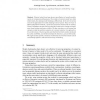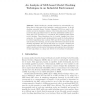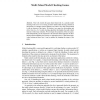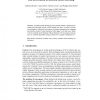117
click to vote
HVC
2005
Springer
15 years 7 months ago
2005
Springer
We present several algorithms for simultaneous SAT (propositional satisfiability) based model checking of safety properties. More precisely, we focus on Bounded Model Checking and ...
113
click to vote
FOSSACS
2005
Springer
15 years 7 months ago
2005
Springer
Nominal calculi have been shown very effective to formally model a variety of computational phenomena. The models of nominal calculi have often infinite states, thus making model ...
119
click to vote
ESOP
2005
Springer
15 years 7 months ago
2005
Springer
ite-state abstraction scheme such as predicate abstraction. The type system, which is also parametric, type checks exactly those programs that are accepted by the model checker. It...
126
click to vote
CHARME
2005
Springer
15 years 7 months ago
2005
Springer
The evolution of SAT technology over the last decade has motivated its application in model checking, initially through the utilization of SAT in bounded model checking (BMC) and, ...
181
click to vote
CHARME
2005
Springer
15 years 7 months ago
2005
Springer
Abstract. Model checking is a formal technique for automatically verifying that a finite-state model satisfies a temporal property. In model checking, generally Binary Decision D...
116
click to vote
CAV
2005
Springer
15 years 7 months ago
2005
Springer
Bounded model checking is an efficient method for finding bugs in system designs. The major drawback of the basic method is that it cannot prove properties, only disprove them. R...
120
click to vote
CAV
2005
Springer
15 years 7 months ago
2005
Springer
Model checking has proven to be an effective technology for verification and debugging in hardware and more recently in software domains. We believe that recent trends in both th...
ATVA
2005
Springer
15 years 7 months ago
2005
Springer
This work extends the game-based framework of µ-calculus model checking to the multi-valued setting. In multi-valued model checking a formula is interpreted over a Kripke structur...
101
click to vote
ATVA
2005
Springer
15 years 7 months ago
2005
Springer
Abstract. Symbolic model checking provides partially effective verification procedures that can handle systems with an infinite state space. So-called “acceleration techniques�...
131
click to vote
ATAL
2005
Springer
15 years 7 months ago
2005
Springer
We present TECTLK, a logic to specify knowledge and real time in multi-agent systems. We show that the model checking problem is decidable, and we present an algorithm for TECTLK ...




